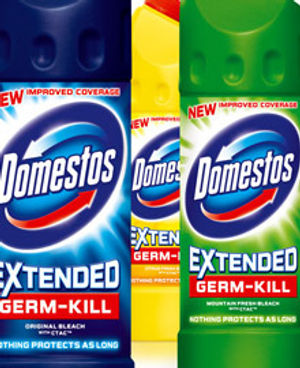It’s true. You have my word - Doreen Tipton has her say on advertising campaigns
I saw a TV advert for bleach the other day, and the voice-over strapline was: ‘Kills up to one hundred percent of all germs’.

This made my ears prick up. For a while I was in shock. The crisps were actually going soggy in my mouth when I finally regained my senses and re-started the chewing process. Had I heard this right?
For years I’ve been conditioned to the slogan of Domestos, probably the best-known bleach brand, which proudly boasts that it ‘kills 99 percent of all known germs – dead.’ And yet here was a new kid on the block, claiming up to 100 per cent. And not just the known germs – but all of them – even the unknown ones. What awesome new power is this? Could this be the end of the Domestos dominance? Did they know something the bleach giants didn’t? Er . . . no. This was a classic case of Ad-Speak. Advertisers, you see, aren’t allowed to tell fibs these days, but they are allowed to twist, torture and strangle the English language until it actually no longer means anything at all, and hope you don’t notice. In legal terms, they have to tell the truth, but not the whole truth and nothing but the truth.
I’ll get back to the bleach in a minute, but in the meantime here’s a classic example of another advertising slogan, and what it really means.
‘No other pain killer works faster!’ What that means is: ‘This pain killer works at the same speed as all the others.’ But that doesn’t quite have the same ring to it, so the advertisers put a bit of positive spin on it, and who can blame them.
So, back to the bleach. Or as Henry V might have said: ‘Once more unto the bleach, dear friends’.
Let’s start with the Domestos slogan. ‘Kills 99 per cent of all known germs – dead’.
We’ll overlook the unnecessary repetition – because when you kill something it normally is dead. But putting that to one side, you may think ‘Well, OK Domestos, you offer a 99 per cent kill rate – that’s not a bad effort.’ Although personally, I do worry about that sinister one per cent germ, don’t you? What is that? Is that the really evil invincible swine of a germ that’s going to pole-axe you while you’re trying wipe off the work surface, so you wake up three weeks later in an isolation ward with no limbs and your skin in a petri dish? But to be fair, at least Domestos has put a marker down so you know exactly where you stand.
But then comes the new kid on the block, attempting to topple the bleach giant with their dramatic new claim: ‘Kills up to 100 per cent of germs.’ Wow. Their 100 per cent sounds a lot better than the pathetic 99 per cent claim of Domestos.
But let’s analyze that fine piece of Ad-Speak a little closer, shall we? ‘Up to 100 per cent’.
Well, first of all, we already know it’s not going to be over 100 per cent – unless you’re a footballer, of course, who always tend to give 110 percent when interviewed. So, what we’re left with is any number up to, and below, 100 per cent.
Now call me an old cynic, but that could mean it only kills one per cent, which is pretty rubbish (unless of course it’s that same evil swine one per cent germ that Domestos can’t kill, in which case it might be worth a punt). Up to 100 per cent could even, technically, mean zero per cent. And what’s interesting is that advertisers are allowed to get away with such meaningless phrases by the regulators. So I could, in theory, also legally advertise myself as killing up to 100 per cent of germs. My cat could be advertised as killing up to 100 per cent of all-known mice – dead. Where does it end? I could set up my own investment bank, and say that I’ll give you up to 100 per cent of your money back – guaranteed – knowing that I’ve actually promised not to necessarily give you any of it.
I think adverts would be a lot more interesting if everybody had to not only stick to the literal truth, but also the spirit of the truth. You’d then get snappy slogans like: ‘Kills quite a few germs, but we’re not exactly sure how many in percentage terms – dead!’ Or how about: ‘No other pain killer works faster, or slower.’
But advertisers, of course, are mere amateurs when it comes to greasing the public with oily words. Politicians are the real masters. Try asking a politician a thorny direct question, such as: ‘Will you increase VAT?’ There are three possible answers. Yes, which means yes. No, which means no. And ‘We have no plans to increase VAT’ which means yes.
Other invaluable political phrases are: ‘Let me be clear’ (which means I am about to be obscure); ‘The real issue is’ (I don’t want to talk about your issue, so can I divert to a different one); ‘It’s too little, too late’ (the opposition has done something annoyingly popular); and ‘My thoughts and prayers are with…’ (meaning, well, absolutely nothing, other than that the politician in question hasn’t got a genuine original thought in their body, and is busy raiding the stock phrase library whilst on auto-pilot).
Politicians talk like this because they’re petrified of saying anything meaningful, in case someone doesn’t like it, and it damages their public image. The irony, though, is that their public image is already well and truly bosted, to borrow an unambiguous no-nonsense Black Country expression. And actually the quickest way to mend it would be to cut the ad-speak waffle and just tell it as it is.
We’re adults. We may not like the truth, but we always prefer it.
Ninety nine per cent of all known politics is a dirty business. Which bleach should we reach for?
Tarra a bit x





